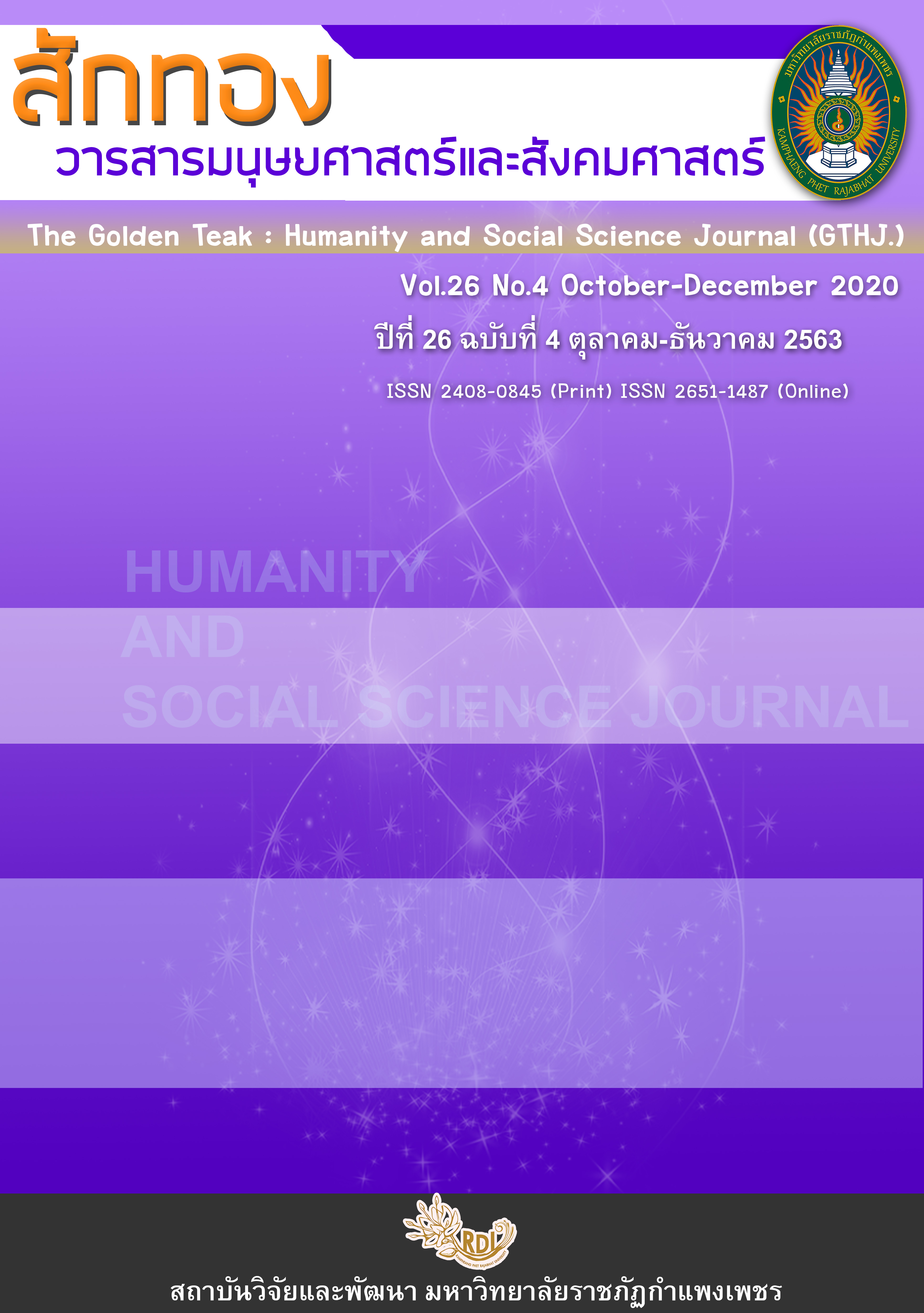Developing Supplementary Materials—Flash Cards in Promoting Learner Autonomy of Primary Students in the Context of a Border Patrol Police School
Main Article Content
Abstract
This research aims to experiment supplementary materials—flash cards in promoting learner autonomy of Grade 4 students at Betty Dumen Border Patrol Police School and to investigate both teacher’s and students’ opinions on the flash cards. The English teacher of Grade 4 and her 12 students participated in this research. The research instruments were 1) pretest and posttest 2) self-report of teachers’ and students’ opinions on the flash cards. The data were analyzed through t-test and content analysis. The results showed that the students’ posttest scores were significantly higher than pretest scores. The teachers’ and students’ opinions on the mentioned teaching materials were positive. This research also highlighted that these flash cards could also promote learner autonomy among these primary students.
Article Details
บทความที่ได้รับการตีพิมพ์เป็นลิขสิทธิ์ของวารสาร สักทอง : วารสารมนุษยศาสตร์และสังคมศาสตร์ สถาบันวิจัยและพัฒนา มหาวิทยาลับราชภัฏกำแพงเพชร
ข้อคิดเห็นใดๆ ที่ปรากฎในวารสารเป็นวรรณกรรมของผู้เขียนโดยเฉพาะ ซึ่งมหาวิทยาลัยราชภัฏกำแพงเพชรและบรรณาธิการไม่จำเป็นต้องเห็นด้วย
References
autonomy. Procedia: Social and Behavioral Sciences, 199, 423-427.
Benson, P. (2001). Teaching and researching autonomy in language learning. Harlow :
Longman.
Benson, P. & Voller, P. (1997). Introduction : autonomy and independence in language
learning. In Autonomy and independence in language learning, eds. P. Benson & P. Voller. Harlow, Essex : Addison Wesley Longman.
Eleanore, H. (2014). The practice of promoting primary pupils’ autonomy: examples of
teacher feedback. Educational Research, 56(3), 295-309.
Farivar, A. & Rahimi, A. (2015). The Impact of CALL on Iranian EFL learners’ autonomy.
Procedia : Social and Behavioral Sciences, 192, 644-649.
Holec, H. (1981). Autonomy and foreign language learning. Oxford UK : Pergamon.
Inthapthim, D. (2010). Learner autonomy among Thai university undergraduates in
contexts of English as a foreign language. Unpublished Doctoral Dissertation.
Division of Education, Arts and Social Sciences University of South Australia.
Klaudia, F. & Huw, J. (2007). Computer-based materials : a study of learner autonomy and
strategies. System, 35(4), 448-468.
La Ganza, W. (2008). Learner autonomy-teacher autonomy: interrelating and the will to
empower. In T. Lamb & H Reinders., eds. Learner autonomy and teacher
autonomy : concepts, realities, and responses., (pp. 63-81). Amsterdam : John
Benjamins Publishing Co.,
Lesley, H. & Whitebread, D. (2000). Interpretations of independent learning in the early years.
International Journal of Early Years Education, 8(3), 243-343.
Little, D. (1991). Learner autonomy 1: definitions, issues and problems. Dublin Ireland :
Authentik Language Learning Resources.
Littlewood, W. (1996). Autonomy: an anatomy and a framework. System, 24(4), 427-435.
Mansour Almusharraf, N. (2018). Learner autonomy and vocabulary development for
female learners of English as a foreign language: teachers’ perspectives.
International Journal of Linguistics, 10(4), 56-74.
Mohammad Hosein, A. (2017). Effect of weblog-based process approach on EFL learners’
writing performance and autonomy. Computer Assisted Language Learning, 30(6),
529-551.
Nunan, D. (1996). Towards autonomous learning: some theoretical, empirical and practical
issues, In R. Pemberton, ESL. Li, WWF Or & HD Pierson, eds. Taking control :
autonomy in language learning. Hong Kong : Hong Kong University Press.
Office of the National Education Commission. (1999). National Education Act B.E. 1999.
Bangkok : Kurusapa Ladprao Press.
Quoc Tran, T. & My Duong, T. (2018). EFL learner’s perceptions of factors influencing learner
autonomy development. Kasetsart Journal of Social Sciences, 30, 1-6.
Razeq, A. & Ahmad, A. (2014). University EFL learners’ perceptions of their autonomous
learning responsibilities and abilities. RELC Journal, 45(3), 321-336.
Scharle, A. & Szabo, A. (2000). Learner Autonomy: a guide to developing learner
responsibility. UK : Cambridge Univesity Press.
Stang, K.K., et al. (2009). Perspectives of general and special educators on fostering self-
determination in Elementary and middle schools. Journal of Special Education, 43
(2), 64-106.
Thakur, V.S. (2015). Using supplementary materials in the teaching of English : Pedagogic scope
and applications. English Language Teaching, 8(12), 1-6.
Vela, V. & Rushidi, J. (2016). The effect of keeping vocabulary notebooks on vocabulary
acquisition and learner autonomy. Procedia : Social and Behavioral Sciences, 232,
201-208.
Williams, M. & Burden, RL. (1997). Psychology for language teachers: A social constructivist
approach. Cambridge UK : Cambridge University Press.
Yagcioglu, O. (2015). New approaches on learner autonomy in language learning.
Procedia : Social and Behavioral Sciences, 199, 428-435.


